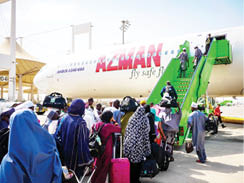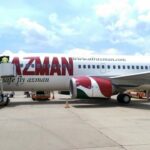The rank of domestic airlines is depleted as one of the carriers, Azman Air, has suspended its operations indefinitely.
Daily Trust reports that the latest indefinite suspension came after a series of disruptions to the operations of the airline.
It would be recalled that the airline in August last year suspended its operations indefinitely citing shortage of aircraft while at the same time sending its staff on leave without pay.
The year 2024 has not been the best year for the domestic airline industry and the entire aviation sector. The woes of Nigerian airlines have been worsened by the challenging macroeconomic environment – galloping inflation, and high cost of foreign exchange, among others.
- Petrol pump price nears N1,000/litre in FCT, states
- Presidential jets: FG, Ogun rebuff Chinese firm’s claims
With most of the airlines’ operating costs denominated in dollars, the naira devaluation has remained a big headache for the airlines which are struggling to survive.
Daily Trust reports that the fleet capacity of domestic airlines has shrunk by over 50 per cent in recent times, resulting in high airfares with a one-way Lagos-Abuja ticket selling for over N200,000.
But the situation might worsen as Azman Air, one of the domestic carriers, has decided to suspend operations indefinitely at a time Dana Air’s operation remains grounded.
The decision by the airline to suspend operations indefinitely is said to be as a result of the worsening macroeconomic variables.
Chairman of the League of Airports and Aviation Correspondents, Suleiman Idris, made the assertion at a conference on ‘Aviation Survivability Amidst A Challenging Macro-Economic Environment’.
He said, “Each of the service providers in the aviation value chain in Nigeria is presently groaning. So also, are the consumers of the service – the passengers and air cargo handlers.
“Organisations prospecting in each of the aviation value chains are also not smiling. The macro-economic policy cannot take them out of the woods.
“The cost of aviation fuel is highly prohibitive. Procuring spares at N1500 to 1 USD has put the airlines in permanent auto-unnerving mode. The ground handlers want to regularly review their tariffs as against the free fall of the naira.
“Statutory training for technical personnel in accordance with the International Civil Aviation Organisation (ICAO) recommended standards and practices is now being rationalised.”
Azman Air, founded by a renowned businessman, Alhaji Abdulmunaf Yunusa Sarina, who is also the President of Airline Operators of Nigeria (AON), started operations in 2010 with a fleet of five aircraft, covering several states in the North. Over time the airline expanded by adding wide-bodied aircraft to boost operation while at the same time venturing into Hajj operations.
However, the operations of the airline had been impaired by the teething challenges in the sector as well as its weak cash flow which saw the Nigeria Civil Aviation Authority (NCAA) suspending its operations in 2021 to conduct an audit of its operation.
In September 2022, the airline resumed operation on a few domestic routes until early 2023 when it suspended operation again after its aircraft were stranded in maintenance facilities abroad.
These are the challenges the airline has faced overtime culminating in the latest suspension.
Members of staff of the airline in Lagos, Abuja and Kaduna also told our correspondent that the airline has suspended operations, and that hope of the aircraft returning to service anytime soon had become dimmer.
A check by our correspondent also indicated that the booking website of the airline, airazman.com, has been suspended. Sources further disclosed that the only plane in the fleet of the airline is with a local maintenance firm.
The highly placed source, which preferred anonymity because he was not authorised to speak with the press, said: “As I am talking to you, there are plans to put up all the aircraft in the fleet of the airline for sale, including the A330, because the owner is deeply concerned about having to run at a loss.
“Out of all his businesses, this is the only one that is giving him a headache because the challenges are enormous and the government doesn’t seem to realise this.”
The airline also sent its staff on leave without pay according to an internal memo.
The exit of Azman has further worsened capacity constraints in the industry amidst the declining fleet of airlines.
A reliable source said another airline with a strong presence in the North is also facing serious financial difficulties. This development, analysts say, is responsible for the hike in fares in line with the principle of demand and supply.
An executive of the Airline Operators of Nigeria (AON), Mr Roland Iyayi, in a chat with Daily Trust said airlines had no option in order to remain in business.
“There is no foreign exchange. No access to foreign exchange. Airlines have aircraft at maintenance facilities worldwide, they don’t have forex to recover. What you have right now is a shortfall in capacity. With the reduced capacity of airlines, seats are at a premium. So, the effect of demand and supply has kicked in.
“If we have more aircraft in the country, then you would have more seats and with demand, you can still manage. But right now, it is difficult to manage your demand,” he said.
Iyayi also said to address the current situation, the federal government “must make necessary arrangements for airlines to have access to foreign exchange in the first instance, reducing the unnecessary taxes and charges applied to the industry and then, of course, ensuring that we have policies that can sustain the growth of the industry.”
Spokesman of the Airline Operators of Nigeria (AON), Prof. Obiora Okonkwo, in an interview recently, lamented that the foreign exchange hike could further increase the cost of tickets.
Okonkwo, who is the chairman of United Nigeria Airlines, said the airlines that are still operating are pushing on out of patriotism.
“As long as the government does not understand the importance of aviation and make the appropriate investments in the sector – investments like creating the enabling environment for the aviation sector to survive, which means access to single digit capital, reduction in all the charges and taxes that impact negatively on air travel business, we will still see increases in ticket prices,” Okonkwo said.
President of Aircraft Owners and Pilots Association of Nigeria, Dr Alex Nwuba, noted that airlines are faced with huge costs from all service providers.
“If we examine aviation fuel, which is probably the largest cost component in the airline business, the prices keep rising. In many climes, hedging provides some breather, here, the business environment provides no such opportunity. The industry has proposed importing their fuel but this like many proposals represents a poorly thought-through demand that will fail to address the issue,” he stated.
He lamented that it appears that there are limited things the aviation sector can do, as it neither controls nor appears to have any input into monetary or fiscal policy.
According to him, the result is that the economy acts as the single largest impediment to the aviation industry, creating instability in travel demand, price and cost inflation; as well as rising operations, high maintenance, and labour costs that erode profit margins and present an existential threat.
Nwuba, however, suggested that operational challenges for airlines are interesting and generally include delays and cancellations, overcrowded airspace, pilot shortages, maintenance and delay disruptions and supply chain disruptions.
“The elements of these are generally considered impediments and the industry looks to probably wrong assumptions as the causes in the Nigerian environment.
“If we ask people in the industry about Nigerian airline’s operating challenges, one of the first issues to be named will be the need for slots to address the airline wave models that have many airlines leaving for Abuja and Port Harcourt at 7 am and the need to create a spread of the operations to address what will be addressed as challenges.”
Aviation analyst, Capt. Samuel Caulcrick, said it is difficult for airlines to survive with the current macroeconomic challenges.
He, however, stated that given the recent history of the airline, its exit might not have too much impact on the industry’s capacity.
Caulcrick lamented that airline owners must separate ownership from management to reduce the number of airlines going into extinction.
“Some of these airline operators see revenue as profit and this must change.” He added that the industry must engage in more code-sharing to cater for passengers that would bear the brunt of airline’s flight suspension.
“The stakeholders would have to coordinate it. I don’t know whether we have to set up a body to coordinate this and I think that would mitigate all these losses,” he said.

 Join Daily Trust WhatsApp Community For Quick Access To News and Happenings Around You.
Join Daily Trust WhatsApp Community For Quick Access To News and Happenings Around You.


